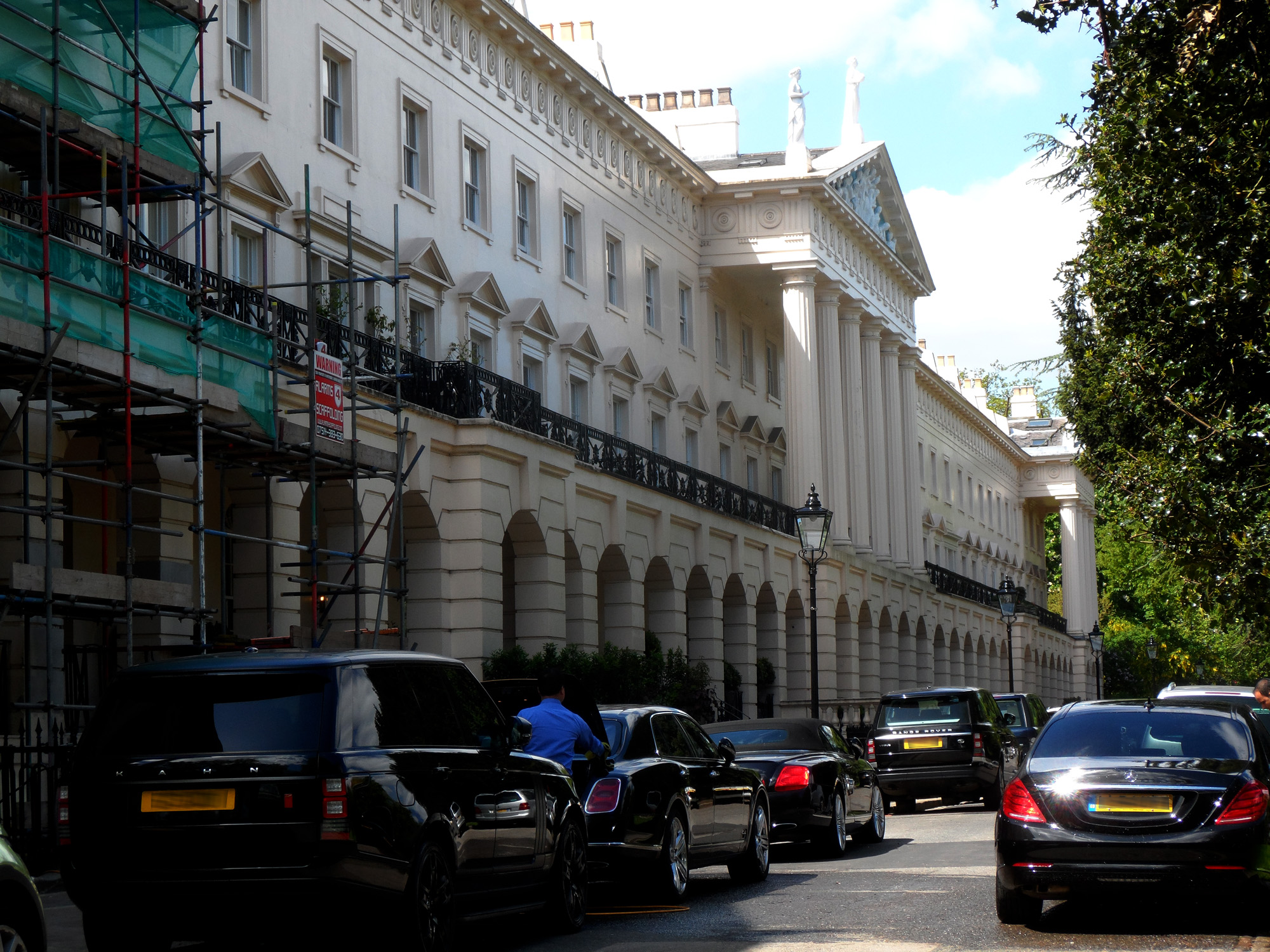
London’s Hanover Terrace, where Damien Hirst is planning an ambitious basement extension to his 19th century villa. Image by Spudgun67 via Creative Commons
“It was the newly dug three-storey basement that had the guests buzzing. Below the cinema, gym and spa (complete with sauna, pool and massage table) sprawled an enormous six-car garage. But how did the vehicles get down there? Our host, an American who worked in finance, was only too happy to demonstrate: The cars were lowered down by a custom-built automobile elevator built into the parking pad in the side garden.”
– Maclean’s 29 July 2015
Basement conversions and extensions are making a big noise in London. In 2001, the Royal Borough of Kensington and Chelsea received 46 planning applications for basement conversions. By 2013, that figure had soared to 450 applications. Rising house prices in the capital are making basement conversions more attractive, mostly to super-rich owners. The expansions can add millions to the value of their already expensive properties, and for those needing additional space a conversion can be cheaper than moving home.
But the trend to build down is not universally popular. Some conversions have hit the headlines because ambitious projects by rich and famous owners have triggered objections from their rich and famous neighbours:
- in 2015, Jon Hunt, founder of Foxtons estate agency, won a legal battle with his neighbours (the French Embassy) to build an enormous basement to house his classic cars (the Embassy plans to challenge the ruling)
- in 2013, Daimler-Benz heir Gert-Rudolf Flick got permission for a two-storey basement beneath his £30 million house in South Kensington. More than 50 local residents, including the cellist Julian Lloyd Webber, had objected to the construction plans, which they described as “entirely selfish”
- last year, Queen guitarist Brian May launched a campaign to ban “iceberg homes” that can occupy more space below ground than the original property above
The bad feeling caused by these subterranean grand designs has spawned a new type of nimby – the “numbing” (Not Under My Bloody Idiot Neighbour’s Garden). Disgruntled neighbours’ concerns include:
- the disruption caused by traffic, plant and equipment
- the effects on the structural stability of nearby buildings and roads
- the noise generated during construction (an experience described by Brian May as “an instrument of torture”)
The role of planning
Beyond the headlines, it’s planning authorities who have to deal with applications for basement extensions and to consider the implications.
Conversions of existing cellars don’t always require planning permission, unless the external appearance of the building is altered, for example by adding a light well. However, excavating the ground under a building to create a new basement may require planning permission, and these are the types of projects that can ignite disputes. As Westminster City Council’s 2014 planning guidance observes, with admirable understatement: “basement development is often contentious…”
Rewriting the rules on basement digging
In 2014, the rising tide of concerns prompted the Royal Borough of Kensington and Chelsea to revise its policy on basement development. The new policy restricts the extent of basement excavation to no more than under half the garden or open part of the site and limits the depth of excavation to a single storey in most cases.
Westminster City Council has moved to make similar changes to its basement extension policy, as has Richmond Council. As well as acknowledging residents’ concerns about noise and disruption, councils are anxious to address the wider environmental impact both during and after basement development. Westminster’s policy notes that:
“The uses associated with basement spaces may be more energy intensive due to additional requirements for lighting, ventilation and pumps, particularly where underground rooms house swimming pools and media rooms.”
Even if planning permission is not needed for basement development, the changes must comply with building control rules on fire safety, ventilation and structure. Neighbours affected by basement projects should also be aware of their legal position:
- the Party Wall etc Act 1996 provides a mechanism for resolving disputes
- the general law of nuisance covers claims for compensation for noise, dust and subsidence
The only way is down?
The number of planning applications for domestic basements in London may have more than tripled since 2011, but a sharp deceleration in the rate of growth last year indicates that the trend may have peaked. As more boroughs tighten the conditions imposed on basement development, building costs are likely to rise and planning processes may be prolonged.
For some owners, however, thousands of pounds in additional costs is a drop in the ocean. Last month, artist Damien Hirst overcame council objections to extend the basement of his home in Westminster. Once the work is complete, it could more than double the value of his historic mansion, making it worth £100 million.
Share
Related Posts
Supporting residents on the decarbonisation journey: leveraging data for effective retrofit projects
As the drive towards decarbonisation intensifies, the social housing sector’s ability to collect, store and manage vast amounts of data becomes increasingly critical. With a shared goal of creating warmer, carbon-free homes, housing associations’ strategic use of data is essential ....
The recent spikes in energy costs have thrown into sharp focus the challenge of heating our homes. Domestic heating is important, not just for our comfort and wellbeing, but to reduce humidity and prevent condensation. But because traditional heating systems ....
By Ian Babelon A new-old concept for proximity “Are we there yet?” Parents may patiently nod to their children’s insistent nudges on a 20-minute journey to… somewhere. Quite rightly, researchers have asked: twenty minutes to what? The answer may well ....

